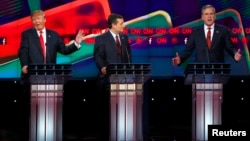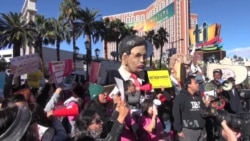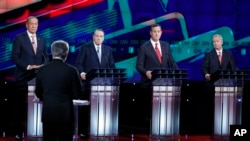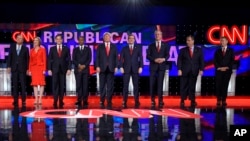Nine leading Republican presidential contenders focused on national security and terrorism issues during their party's fifth Republican debate.
The debate Tuesday in Las Vegas, Nevada took place less than two months before the Iowa caucuses - the crucial, first nominating event of the primary election season.
It began with a discussion on frontrunner Donald Trump's controversial recent promise to temporarily ban Muslims from entering the United States.
The billionaire reality television star and real estate developer defended the proposal, saying "we are not talking about religion, we are talking about security."
Trump said the proposal had prompted a "very big discussion that needed to be opened up" on "radical Islamic terrorism," noting many Americans support it.
Former Florida governor Jeb Bush had several high profile clashes with Trump, and slammed the proposal as unrealistic, saying it would hurt the U.S. fight against Islamic State.
"Donald Trump is great at one-liners, but he's a chaos candidate, and he'd be a chaos president. He's not the commander in chief we need to keep our country safe," Bush said.
Trump shot back, saying Bush was attacking him because his campaign has been a "total disaster."
Watch video report from VOA's Mike O'Sullivan:
Texas Senator Ted Cruz, who has been surging in recent polls, offered only mild criticism of Trump, saying he does not want a "war on a faith, but a war on a political and autocratic ideology that seeks to destroy us."
"If elected, we will hunt down and kill the terrorists," Cruz said. "We will utterly destroy ISIS. We will stop the terrorist attacks before they occur because we will not be politically correct."
Cruz also defended his recent vow to "carpet bomb" Islamic State. Such a plan would not target innocent civilians, he said, but aim to kill Islamic State fighters.
"What it means is using overwhelming air power to utterly and completely destroy ISIS," said Cruz, who accused the White House of carrying out a campaign of "photo op" foreign policy.
Trump a topic of 'undercard' debate
Earlier, a pre-debate featured four other candidates - former Pennsylvania senator Rick Santorum, former Arkansas governor Mike Huckabee, South Carolina Senator Lindsey Graham and former New York governor George Pataki - who did not qualify for the main event,
In the first set of questions at the undercard debate, the subject was a proposal from a candidate who was not yet on stage: front-runner Donald Trump and his call to temporarily bar Muslims from traveling to the U.S.
Graham rejected the idea, apologizing to allied Muslim leaders in Jordan, Egypt and elsewhere. "I am sorry. He does not represent us," Graham said.
Trump's campaign initially said his ban on Muslims entering the U.S. would apply to everybody, but he later said it would not apply to leaders from Muslim nations.
Pataki lashed out at Trump and Democratic front-runner Hillary Clinton. He said, "Neither is fit to be president of the United States."
Trump, Cruz remain frontrunners
This latest face-off comes amid public concerns about terrorism and national security, and new poll numbers that buttress the campaigns of real estate Trump and Cruz.
Trump continues to lead in national polls, but Cruz is surging in Iowa, the state that begins the presidential candidate selection process with its caucus voting on February 1.
The poll results suggested that concern about terrorism in the wake of the December 2 attack in San Bernardino, California, was having an impact on voters.
“The last time Quinnipiac University polled, the economy was the top issue. Now it is terrorism, a subject on which Donald Trump gets the highest rating of any of the candidates,” said Quinnipiac assistant polling director Peter Brown. He added that Cruz “appears to be the main beneficiary of Dr. [Ben] Carson’s apparent collapse.”
Cruz in Iowa
A new Quinnipiac University poll of likely Iowa Republican caucus participants indicated a close race between Trump at 28 percent and Cruz with 27 percent. U.S. Senator Marco Rubio of Florida was third with 14 percent, and Carson, a retired neurosurgeon who led the last poll in October, was fourth with 10 percent. No one else was above 5 percent.
The Quinnipiac poll came on the heels of the latest Des Moines Register/Bloomberg Politics poll, which also had Cruz in first place in Iowa.
Cruz’s long-term strategy of trying to appeal to a range of conservative voters may be paying off as he draws support from tea party activists, foreign policy hawks and evangelical Christian voters who make up a key core constituency among Iowa Republican caucus voters.
Trump remains in the top spot nationally among Republican voters, according to the latest Wall Street Journal/NBC News poll. Trump was at 27 percent in the survey, followed by Cruz with 22 percent, Rubio in third with 15 percent and Carson in fourth place with 11 percent.
The Cruz surge in Iowa caught Trump’s attention, and he’s become more aggressive in his critique of the freshman Texas senator.









